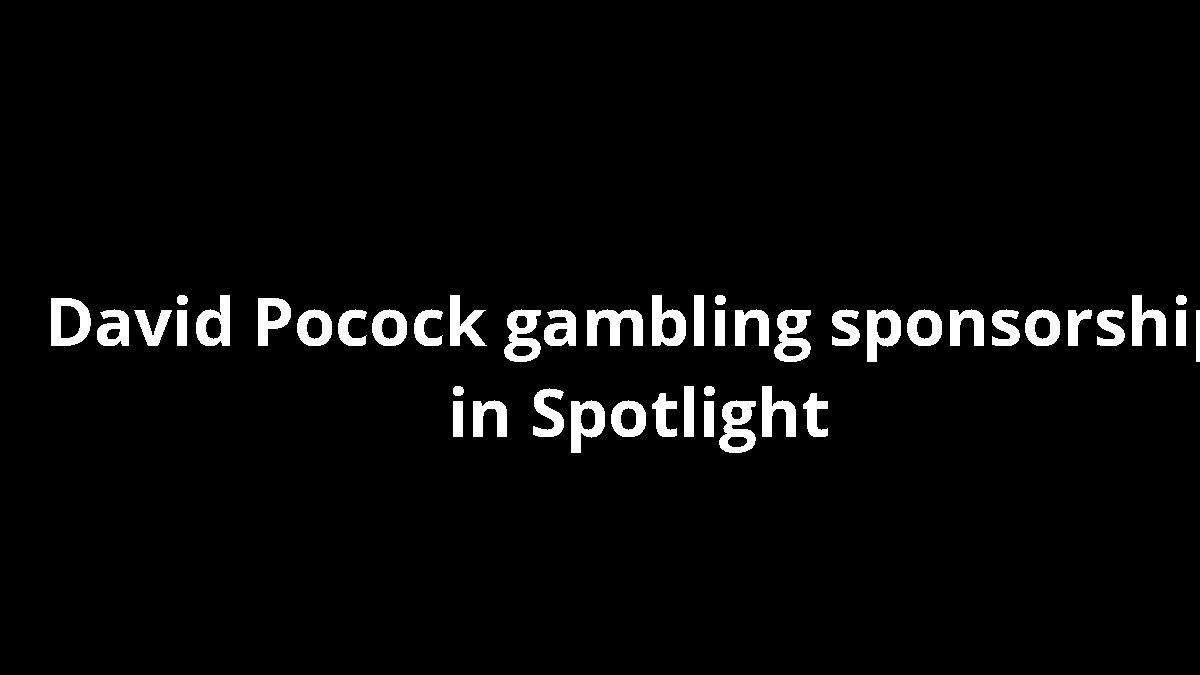Pocock Expelled From Parliamentary Sports Club Over Gambling Sponsorship Critique
Independent ACT Senator David Pocock has been declared persona non grata by the Parliamentary Sports Club after publicly criticizing the club’s links to the gambling industry. The committee confirmed that Pocock’s club membership was cancelled following his explicit questioning of the organization’s sponsorship ties to betting brands and other gambling interests. Pocock’s public stance framed the issue as part of a broader debate about integrity in sport and the influence of gambling sponsorship on both athletic and political life. The move has ignited a national discussion about sponsorship ethics, governance, and the delicate boundary between sport and public office, and it foregrounds the phrase the David Pocock gambling sponsorship issue in the public lexicon.
Background and Facts
- Pocock publicly questioned the club’s sponsorship ties to betting brands, prompting governance questions and a robust debate over sponsorship ethics that extends beyond rugby.
- The Parliamentary Sports Club’s disciplinary committee reportedly found that membership terms were breached by critical public comments, raising questions about freedom of speech versus club values.
- Club officials emphasised that membership involves adherence to shared values and norms, including conduct that protects the club’s reputation and its relationships with sponsors.
- Reactions from supporters and opponents highlighted the tension between defending open dialogue and safeguarding organizational integrity in a high-profile sporting body.
- The incident sits within a broader context of sport-funded sponsorship pressures and political accountability, illustrating how sponsorship ethics can spill into parliamentary discourse.
- Analysts note the case could influence how clubs articulate sponsor policies and how public figures balance advocacy with membership obligations.
Public Reaction and Stakes
- Allies of Pocock argue the move is punitive and a chilling effect on political discourse about a matter of public concern and sport’s funding sources.
- Club leadership and some critics contend that organizations must safeguard their reputation and avoid public-affairs entanglements that could compromise sponsorship deals.
- Analysts suggest the case could set a precedent for handling dissent among members who are public figures, potentially reshaping membership codes.
- International rugby communities have wrestled with sponsorship ethics, providing a comparative lens for this debate and highlighting how different unions navigate sponsorship exposure.
- Supporters emphasize the need for transparency in how clubs communicate about sponsorships and how members engage with public policy debates.
- Opponents warn that punitive actions could discourage critical questions that inform public interest and governance reforms in sports.
The fallout raises questions about how clubs balance sponsorship realities with democratic norms, and whether governance rules need updating to reflect current public expectations. For more context on sports sponsorship ethics, see BBC Sport Rugby and World Rugby.
Context: Senator Pocock’s Public Criticism of Club’s Gambling Links
Pocock’s criticisms arrived amid a wider debate about the integrity of sport and how sponsorship influences players, clubs, and political life. The David Pocock gambling sponsorship conversation has become a focal point for discussions about transparency and accountability in both sport governance and parliamentary life. Critics argue that heavy sponsorship from gambling interests can distort priorities, while supporters caution against silencing questions that touch on public trust. Meanwhile, stakeholders in rugby and other sports are watching closely to see if this case prompts stronger rules or clearer boundaries between sport and politics.
Public Criticism and Integrity in Sport
- The senator framed sponsorships as potential conflicts of interest that warrant public scrutiny and debate about best practices.
- Advocates argue that athletes and lawmakers have an obligation to question ethically murky partnerships and disclose potential conflicts.
- Opponents warn that over-regulation could chill legitimate sporting dialogue and dissent that fuels governance reforms.
Gambling Sponsorship in Rugby
- Rugby has seen a mix of sponsorships from betting brands and responsible-gaming initiatives aimed at harm reduction and player welfare.
- Analysts emphasise the need for clear guidelines that separate commercial interests from governance and public policy influence.
- The debate intersects with broader sponsorship reforms in major leagues and unions worldwide, including how revenue is allocated to grassroots programs.
- Professional bodies like BBC coverage and World Rugby often highlight the balance between revenue generation and risk management in sponsorship deals.
As this debate unfolds, readers can consult BBC Sport Rugby for ongoing coverage and World Rugby for governance guidelines and sponsor disclosures.
Club’s Stance and Repercussions for the Senator
The Parliamentary Sports Club defended its decision as a defensive measure aimed at preserving its core values and the integrity of its membership. Officials argued that members—a category that includes notable former players and office-holders—must avoid actions that could undermine the club’s reputation or create conflicts of interest. The club’s stance has alarmed some supporters who fear punitive action against political expression, while others argue the membership rules are explicit and enforceable. In this climate, the club’s leadership suggests that the repercussions reflect a standard that must apply evenly, regardless of status or public profile, to maintain collective trust and the legitimacy of its sponsorship relationships.
Governance and Repercussions
- Disciplinary processes were framed as necessary to maintain reputational standards for a club with public affiliations and high-profile members.
- Officials assert that club values guide membership consequences, including actions for perceived public harms or perceived conflicts of interest.
- Critics call for transparent, codified guidelines to prevent ad hoc enforcement in sensitive political matters and to ensure fair treatment of all members.
- Some voices propose independent review mechanisms to assess whether disciplinary measures are proportionate and justified.
Checks and Balances
- Observers urge for stronger, independent oversight of clubs with public profiles to ensure governance fairness and consistency.
- There is demand for clearer conflict-of-interest policies to guide lawmakers who participate in sport governance and to delineate lines between advocacy and club duties.
- The case could influence how clubs communicate with members about permissible political commentary and the consequences of breaches.
For broader governance context, see BBC Sport Rugby and World Rugby.
Broader Implications for Sponsorship Ethics in Sport and Parliament
The incident is likely to reverberate beyond this single club, possibly prompting policy reviews in both sports and public life. Ethical debates around sponsorship are not new, but the current case spotlights how sports entities and governing bodies manage relationships with the gambling sector and how public officials balance their roles in governance with political advocacy. If reforms emerge, they could compel clubs to publish sponsorship disclosures, strengthen conflict-of-interest policies, and articulate clear boundaries that protect both sport integrity and political accountability. In this tense moment, the case becomes a catalyst for discussions about transparency and governance that could shape future sponsorship norms across rugby and other codes.
Transparency and Conflict of Interest
- Calls for open disclosure of all sponsorship agreements and the roles of public figures in club governance, including any cross-appointments.
- Proposals to separate commercial partnerships from decision-making authorities to reduce perceived influence on policy and strategy.
- Advocates argue for independent audits of sponsorship contracts and public reporting to build trust among fans and taxpayers.
- Media watchdogs and civil-society groups push for clearer pathways to challenge perceived governance lapses.
Policy Reforms and Practices
- Some stakeholders propose standardized guidelines for sport-parliamentary intersections, including cooling-off periods for public officials in governance roles.
- Governance reforms could include clearer codes of conduct and enforceable sanctions for breaches that affect public trust.
- Educational initiatives may teach athletes and lawmakers how sponsorships influence public perception, policy decisions, and stakeholder relationships.
- Jurisdictions with transparent reporting practices provide blueprints for how to balance sponsorship revenue with governance integrity.
For ongoing discourse on governance in sport, see BBC Sport Rugby and World Rugby. The debate also raises questions about how rugby bodies can foster responsible sponsorship frameworks that support the sport’s growth while safeguarding public trust.
What Comes Next for Pocock and the Parliamentary Sports Club
Looking ahead, Pocock and his allies are expected to pursue available channels to address what they describe as a punitive decision aimed at silencing political discourse around a contentious issue. Depending on the pathway, the senator could seek formal reviews, appeals, or whistleblowing remedies under parliamentary or club governance rules. The potential for appeals or independent mediation exists, and external scrutiny could push for reforms that reinforce transparency and accountability. This case may also prompt clubs and public bodies to renew their commitments to ethical partnerships and to articulate clearer expectations for members who operate at the intersection of politics and sport. The broader implication for the relationship between sport and public life is that stakeholders will increasingly demand explicit standards around sponsorships and governance, ensuring that decision-making remains principled and accountable. The David Pocock gambling sponsorship discussion is likely to resurface in parliamentary and sports forums as reforms are debated.
Possible Channels and Remedies
- Internal reviews, appeals, and mediation processes offered by the club or parliamentary committees, including potential independent oversight.
- Independent bodies could assess governance breaches and sanctions to ensure due process and proportionality.
- Public disclosures and transparency measures may be introduced to clarify sponsorship terms and avoid conflicts of interest.
- Rules for interaction between parliamentarians and sports bodies could be revised to reduce ambiguity and risk.
Potential Reforms for Governance
- Clearer codes of conduct for members who hold public and sporting roles, including red-lines on political advocacy within clubs.
- Robust conflict-of-interest policies with timelines, disclosures, and enforceable sanctions for violations.
- Structured public reporting to enhance trust among fans, stakeholders, and taxpayers, with independent annual audits.
As this story continues to unfold, readers can stay informed through reliable sources like BBC Sport Rugby and World Rugby. The central question for rugby fans remains: how should sports sponsorships be managed when political life intersects with athletic institutions? The ongoing conversation is likely to shape the future of sponsorship ethics in both sport and parliament, guiding how clubs navigate sponsorship opportunities while preserving integrity and public trust.


